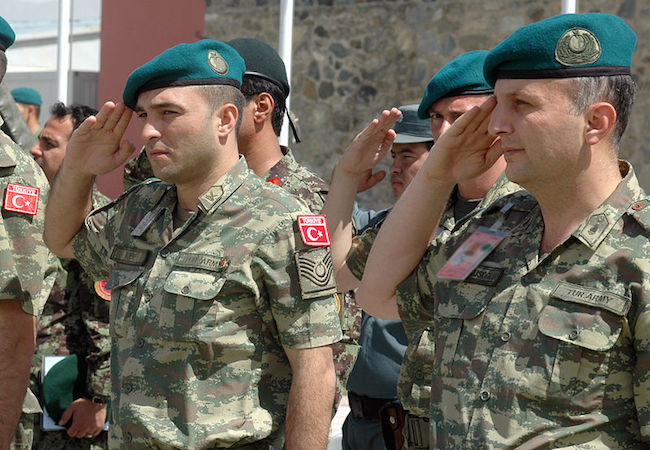
By Yavuz Yener
Only a small group of states have been eager to closely follow the changing “nature of warfare”. Among them, for instance, the United States regularly updates its defense strategy every four years according to its shifting security environment and priorities. The U.S. Navy is expected to revise its strategy in 2015 and the U.S. Department of Defense already published its Quadrennial Defense Review in 2014. Turkey remains the eighth strongest conventional military power in 2015, according to the Global Firepower rankings.[i] Yet, it has long needed a strategic vision similar to that of the U.S. in order to effectively address emerging security threats within and around its neighborhood. Accordingly, the Turkish Armed Forces (TAF) recently revealed its intent to review and update Turkey’s military strategy.
The context
Turkey’s traditional military priorities were largely shaped by the Cold War rivalry, its position within the Western Camp, and its threat perceptions emanating from hostile neighbors. The preparedness needed to meet those challenges required a huge defense budget, an enormous standing army, an immense effort on behalf of training troops, and the army’s procurement of modern military equipment. However, with the end of the Cold War and outbreak of several armed conflicts in the region – including the U.S. invasion of Iraq, the Russo-Georgian War, the Syrian Civil War, the rapid advance of the Islamic State of Iraq and Syria (ISIS), and the on-going armed clashes between Ukraine and Russia- Turkey has felt the need to revise its traditional defense strategies.
Subordination to policy
As Carl von Clausewitz wisely suggested, war is/should be subordinated to politics. The logic here is straightforward: politicians define the objectives; the military in turn investigates the means and acts upon the politicians’ will.
Last November, Turkey’s Chief of the General Staff Necdet Ozel presented the army’s 2033 vision entitled “TAF’s 2033 Plans” to Prime Minister Ahmet Davutoglu and Ministers from his cabinet. Although no official document has been made public, we have been aware of these developments thanks to the Q&A session at the end of the meeting in question, which gave significant insight into the details of the Plan.
Two dimensions: effectiveness and a professional army
Some details of the Plan are striking. Above all, we should not underestimate the timeframe of the Plan, which spans to 2033. This indicates that the military is concerned about the next 20 years, and is willing to prepare itself for fighting future threats. Moreover, the crucial point here is that the threats of the future cannot be foreseen looking from 2015. Thus, it is vital to be flexible and update whatever the objectives are depending on the changing conditions of the security environment.
Nonetheless, there are two main elements of the Plan that seek greater attention: effectiveness and a professional army.
The first obstacle concerning the effectiveness of the Turkish Armed Forces involves modernization. The national defense industry in Turkey has been booming for the last 10-15 years and the experiences and outcomes gained from these efforts have been reflected in the army’s inventory and assets up to this point. It is vital to sustain such endeavors. The Plan aims to complete modernization of military equipment by 2033. 18 years may sound like a joke, but it is not. On the contrary, this is a realistic timetable considering the army’s huge institutional structure and skepticism of innovation.
The second point concerns the debates about a professional army. Seeing that there is increasing public discomfort in Turkey towards compulsory military service, the recent enthusiasm for temporary paid exemption from conscription has come as no surprise. As Defense Minister İsmet Yılmaz stated, the number of applications for paid exemption from the military service exceeded 72,000,[ii] the highest rate of all other times that the window for paid military service exemption has been opened.
The Turkish army by and large depends on quantity rather than quality. This does not mean that the Turkey’s military capabilities are inadequate. But still, the number of standing troops is traditionally considered as a deterrent force. This reliance on numbers still persists in the modern Turkish army to some extent. Hence, army officials are still skeptical of abolishing compulsory military service in the short run.
Instead, the military’s main objective is to increase the number of Special Forces, which is in parallel with the U.S. Quadrennial Defense Review of 2014. The U.S. military, amidst serious budgetary cuts, is striving to prioritize its Special Forces in a security environment where non-state actors and insurgencies are emerging as the primary threats to traditional armies. Accordingly, the Turkish military officers also agree with this approach. “The war strategies will change in the next 20 years. Attacks aiming to create internal crisis, rather than land warfare, will come to the fore,” officers said.
The TAF can be considered a quasi-professional army in which the core still consists of regular conscripts. But the prospect that Plan could increase the proportion of Special Forces in the TAF should be considered. If successfully realized, this will enable the army to be formidably prepared to face both conventional armies such as those of Turkey’s traditional rivals in the region and irregular threats such as radicalism and terrorist organizations.
Conclusion
The 2033 Plan of the TAF is a crucial strategic initiative. Yet, it has to be consolidated with political will and open-mindedness. 18 years is not a very long time for a state, but the hazards surrounding Turkey may not leave it with the comfort to adapt slowly. Thus, Turkey should not be too reluctant to address the security threats in the region. The sooner the objectives are well-defined and realized, the less risks Turkey will be faced with in the future.
Notes:
[i] Countries Ranked by Military Strength, accesses February 5, 2015, http://www.globalfirepower.com/countries-listing.asp
[ii] http://2015bedelliaskerlik.com/iste-bedelli-askerlige-basvuru-sayisi-2




